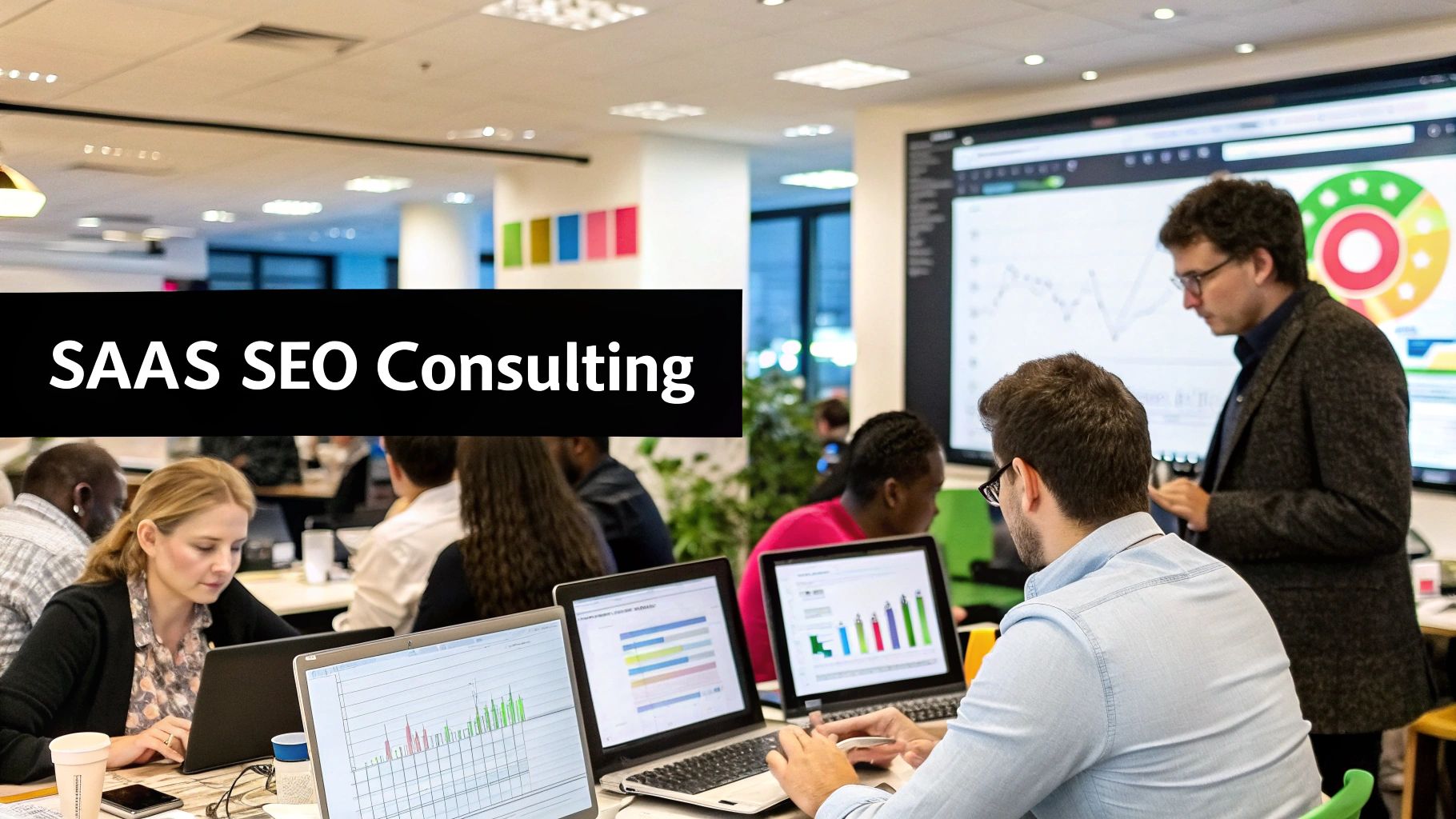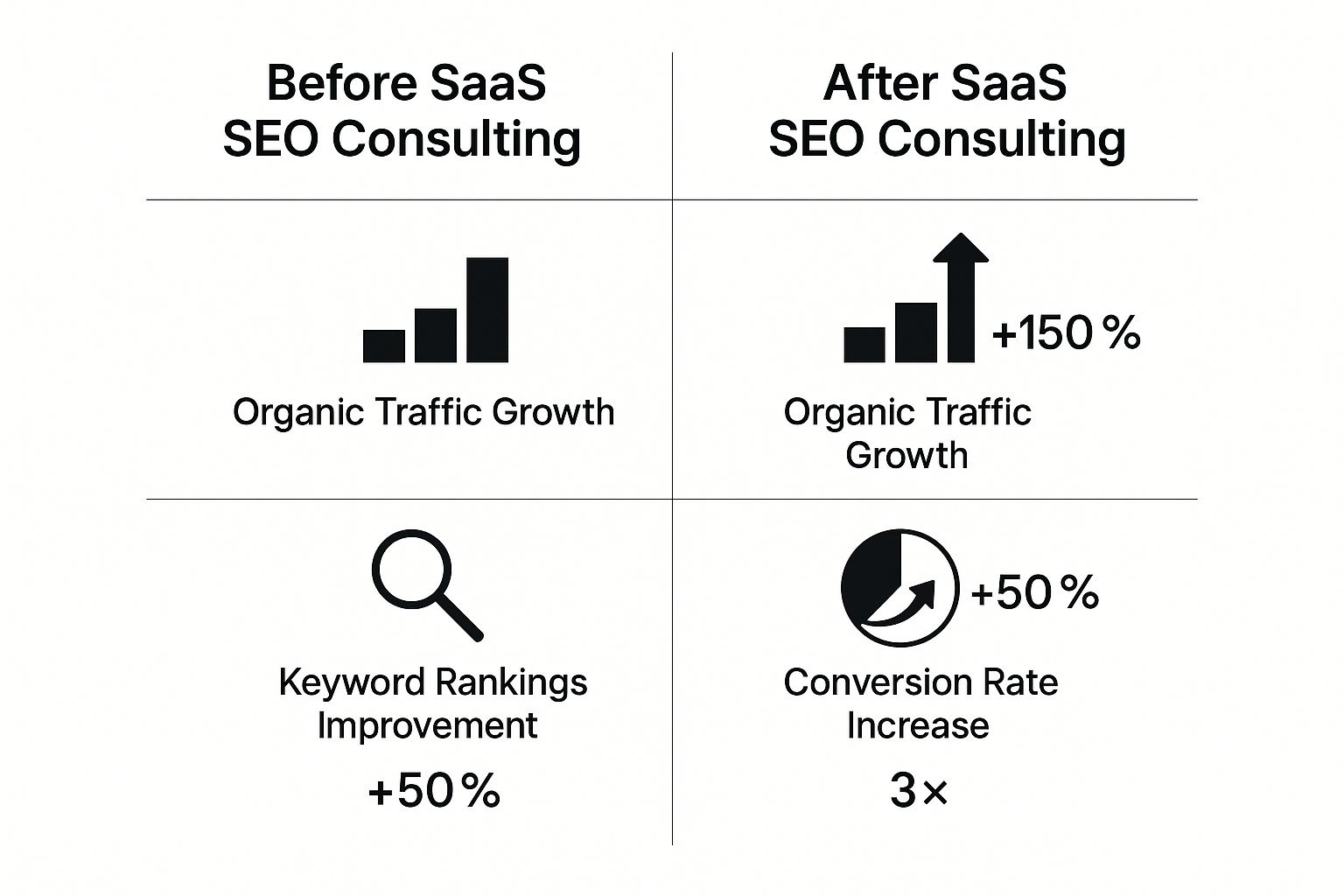SaaS SEO consulting isn't just about sprinkling a few keywords onto your website. It’s a completely different discipline, built from the ground up for the unique world of Monthly Recurring Revenue (MRR), customer churn, and the long, winding road people take before buying software. It scraps generic tactics and focuses on the very specific growth challenges that software companies face every single day.
Why SaaS SEO Consulting Is Your Growth Engine

Think of standard SEO as a one-size-fits-all wrench. Sure, it's useful for a lot of basic jobs, but you wouldn't use it for a high-stakes engine repair. That’s where SaaS SEO consulting comes in—it’s the custom-calibrated toolkit designed precisely for your software's engine. Getting this distinction right is what separates slow growth from a sustainable acquisition machine.
And let's be clear: the SaaS market isn't just competitive, it's exploding. Projections show the worldwide SaaS market is expected to rocket up by 19.38% every year, hitting a staggering $793.1 billion by 2029. With the average company now juggling 106 different SaaS apps, just having a website isn't enough. Your SEO has to be sharp enough to cut through all that noise. Discover more insights about SaaS market growth on mailmodo.com.
The Specialist Advantage in a Niche Market
A generalist SEO agency might get excited about broad traffic numbers, but a SaaS specialist knows that success isn't about more traffic—it's about the right traffic. They understand your real goal is attracting highly specific, problem-aware users who are actively looking for a solution like yours. A generic approach almost always misses the nuances of the SaaS sales cycle, which just leads to wasted time and a pipeline full of unqualified leads.
SaaS SEO consulting is built to solve the unique challenges that generalists often don't even see:
- Complex Buyer Journeys: People don’t impulse-buy software. They research, they compare, and they need to see demos. A specialist knows how to build content for every single step of that journey, from top-of-funnel articles that educate to bottom-of-funnel comparison pages that close the deal.
- High-Intent Niche Keywords: The keywords that actually make you money are rarely the ones with massive search volume. A real SaaS consultant hunts for long-tail keywords that signal a user is ready to buy, like "erp software for manufacturing inventory." That’s where the magic happens.
- Technical Platform Complexities: Let's face it, most SaaS websites are built on complex JavaScript frameworks that can give search engine crawlers a major headache. A specialist knows how to navigate these technical hurdles to make sure Google can actually find, crawl, and index your pages properly.
A specialized SaaS SEO consultant doesn't just drive traffic. They architect a system that attracts, educates, and converts the right people into long-term subscribers. It’s about building an organic acquisition channel that directly fuels your MRR.
Moving Beyond Rankings to Revenue
At the end of the day, ranking #1 on Google is a vanity metric if it doesn't make you money. The real goal is to generate qualified leads that turn into paying customers. A SaaS SEO consultant connects the dots between organic search performance and real business outcomes—like more free trial sign-ups, demo requests, and ultimately, new revenue.
This laser-focused approach means every blog post, every landing page, and every technical fix serves one single purpose: to grow your software business. It transforms SEO from a marketing expense into a predictable and powerful growth engine.
The Three Pillars of a Powerful SaaS SEO Strategy
A winning SaaS SEO strategy isn’t just a checklist of random tactics. It’s a complete system built on three core pillars that work together to attract, engage, and convert your ideal customers.
Think of it like building a high-performance engine: you need a solid engine block (Technical SEO), high-octane fuel (Content Strategy), and a powerful ignition system (Authority Building).
This balanced approach is the heart of effective SaaS SEO consulting. If one pillar is weak, the entire growth engine stalls. Let's break down how these pieces fit together to drive real business results.
This is what it looks like when a proper SaaS SEO strategy kicks in, transforming key growth metrics.

As you can see, the right strategy turns flat performance into massive gains across traffic, keyword visibility, and, most importantly, conversions.
Pillar 1: The Technical SEO Foundation
Technical SEO is all the behind-the-scenes work that makes sure search engines can actually read your complex SaaS platform. It’s the foundation that makes everything else possible, and for most SaaS companies, this is where the biggest problems hide.
SaaS websites are often built on JavaScript-heavy frameworks, which can throw a real wrench in Google's crawlers. If search engines can't render your pages correctly, they can't index your content. You're basically invisible.
A specialist in SaaS SEO consulting will obsess over:
- JavaScript Rendering: Making sure Google’s bots see the same critical content your users do.
- Site Speed: Optimizing page load times, which is a huge ranking factor and even more critical for user experience. A slow pricing page will absolutely kill your conversions.
- Crawlability and Indexability: Ensuring search engines can navigate your site without hitting dead ends or indexing the wrong pages (like free trial environments).
Without a solid technical foundation, even the world's best content won't rank. It's the first and most critical step.
Pillar 2: A Full-Funnel Content Strategy
The second pillar is about moving beyond generic blog posts to build a complete customer journey with content. A great SaaS content strategy doesn't just attract visitors; it guides them from being vaguely problem-aware to confidently solution-aware.
This means creating specific content for each stage of the marketing funnel:
- Top-of-Funnel (ToFu): This content targets users just starting to research a problem. Think blog posts like "How to improve team productivity" or "Best ways to manage customer data." The goal is to cast a wide, relevant net.
- Middle-of-Funnel (MoFu): Here, you target users actively comparing solutions. This is where content like "Project management software vs. spreadsheets" or in-depth feature guides comes in.
- Bottom-of-Funnel (BoFu): This is where you close the deal. The content is hyper-specific: comparison pages ("OurTool vs. Competitor"), alternatives pages, pricing page optimizations, and detailed case studies.
A classic mistake is pouring all your resources into Top-of-Funnel content. A true SaaS SEO strategy builds a content moat around your product, answering every single question a potential customer might have, from their initial headache to the final purchase decision.
This full-funnel approach makes sure you capture high-intent traffic at every single step. For a deeper look at this process, check out our complete guide on SEO for SaaS companies.
Pillar 3: Modern Authority Building
The final pillar is all about building trust and credibility, both with users and with search engines. In the old days, this just meant chasing backlinks. Today, building authority for a SaaS brand is far more sophisticated, focusing on proving your Expertise, Authoritativeness, and Trustworthiness (E-E-A-T).
Modern authority building isn't just one thing; it's a mix of smart tactics:
- Digital PR: Earning mentions and links from reputable industry publications, not just by guest posting but by providing expert commentary or data-driven insights that journalists want to cite.
- Topic Clusters: Creating comprehensive content hubs around your core product features. This signals to Google that you are a genuine authority on a specific topic.
- Integration Partnerships: Getting listed on your partners' integration pages is a killer way to get highly relevant backlinks and valuable referral traffic.
Research from Stratabeat confirms this isn't just theory. A 2025 analysis of over 300 B2B SaaS websites found that the top performers—many pulling in up to 10 million in monthly organic traffic—consistently prioritized high-quality content and authority. The data proves just how massive the upside is for those who get it right.
How to Hire the Right SaaS SEO Consultant

Picking the right SEO partner might just be the most important marketing decision you make. A true specialist can build you a predictable growth engine. A generalist can burn through your budget and leave you with nothing to show for it.
When you’re vetting a potential partner for SaaS SEO consulting, you have to dig deeper than surface-level questions about rankings and traffic. You need someone who thinks like a SaaS founder, not just a marketer. That means they get the metrics that actually drive your company forward.
Don't make the costly mistake of hiring someone who doesn’t understand the unique, high-stakes game of marketing software.
Demand SaaS-Specific Proof
First things first: filter out the generalists. An SEO who crushed it for a local plumbing company or an e-commerce store is not automatically ready for the complexities of SaaS. The playbooks are completely different.
When you're talking to a potential consultant, insist on seeing proof that they've done this before, specifically in the software world.
- Ask for SaaS Case Studies: You want to see their work with other SaaS companies. Look for real growth in metrics that matter—free trial sign-ups, demo requests, qualified leads—not just vanity metrics like traffic.
- Check if They Speak Your Language: A real pro will be comfortable talking about Monthly Recurring Revenue (MRR), customer churn, and Lifetime Value (LTV). They should be able to draw a straight line from their SEO strategy to these core business drivers.
- Look for Niche Experience: If you’re in a specific vertical, like "compliance software for financial institutions," ask if they have experience in similarly technical or niche markets.
A consultant’s portfolio should look like your industry. If all you see are B2C brands, that’s a massive red flag. This isn't just a preference; it's a non-negotiable part of your evaluation.
Evaluate Their Strategic Approach
Once you’ve confirmed they have legit SaaS experience, it’s time to get into their head. A top-tier consultant won’t just talk about keywords and backlinks. They’ll lay out a holistic plan connecting SEO activities directly to your business goals.
This is where you separate the tacticians from the true strategists. Your goal is to understand how they think about solving your specific growth challenges.
Ask the Right Questions
During your calls, use sharp, targeted questions to see how deep their knowledge really goes. Don't let them off the hook with generic answers. Push for specifics.
Here’s a checklist of questions you should be asking any potential SaaS SEO consultant:
- Keyword Research Process: "How do you find bottom-of-the-funnel keywords for a niche product like ours? Walk me through how you’d uncover high-intent, low-volume terms that actually convert."
- Content Strategy: "Beyond the blog, what content types do you recommend to attract customers at each stage of the journey? What’s your process for creating comparison or 'alternative' pages?"
- Technical SEO for SaaS Platforms: "Our platform is built on a complex JavaScript framework. What’s your experience with technical SEO for sites like ours, and how do you make sure our key pages get crawled and indexed properly?"
- Authority Building: "How do you build authority and earn backlinks in a technical industry like ours? What do you do beyond guest posting? Think digital PR or integration partnerships."
- Reporting and KPIs: "Which KPIs will you report on, and how will you tie those metrics back to business goals like MRR and LTV? Can you show me an example of a monthly report you’ve used for another client?"
Asking these kinds of questions forces them to prove their expertise on the spot. Their answers will tell you everything you need to know: whether they have a real, repeatable process for growing software companies or if they're just applying a generic SEO template.
Choosing the right partner isn’t about hiring a vendor. It’s about finding a strategic ally who understands your world and can build a system that delivers sustainable, long-term growth.
Navigating the Future of SaaS Search
The way your customers find software is changing. Fast. An SEO strategy stuck in the past is a recipe for becoming invisible. To stay ahead, your approach can't just focus on today’s Google algorithm; it has to be built for tomorrow's search world. A smart SaaS SEO consulting plan doesn't just react to changes—it sees them coming.
This means building a resilient, diversified strategy that gets you seen wherever your future customers are looking. The search engine results page isn't just ten blue links anymore. It's a dynamic space, packed with new features and powered by technologies that are completely rewriting user behavior.
The Impact of AI on SaaS Discovery
The biggest shift? The rise of AI-powered search, especially Google's AI Overviews. These AI-generated summaries pop up at the top of the search results for valuable, high-intent queries. They provide direct answers, often making it unnecessary for users to click through to a website. For SaaS, this is a game-changer.
Think about queries like "best project management tool for small teams" or "HubSpot alternatives." These are now prime real estate for AI Overviews. If your content isn't built to be easily understood and cited by AI, you risk being shut out of the most important conversations.
A modern SaaS SEO consultant knows this and focuses on creating clear, fact-based, and highly structured content that AI can easily grab and feature. This means:
- Answering Questions Directly: Structuring content to give concise, authoritative answers to the exact questions users are asking.
- Emphasizing E-E-A-T: Doubling down on Expertise, Experience, Authoritativeness, and Trustworthiness to prove you're a credible source.
- Using Structured Data: Implementing schema markup to explicitly tell search engines what your content, features, and pricing are all about.
Getting featured in an AI Overview positions your SaaS as the definitive solution right when a potential customer is making a decision. It's the new "position zero," and optimizing for it is non-negotiable.
Expanding Beyond Traditional Search Engines
Winning in the future also means admitting that Google isn't the only game in town. Your ideal customers are searching for solutions everywhere, and your strategy needs to meet them there. A great consultant builds your presence where your audience already hangs out.
The modern SaaS buyer's journey is messy and non-linear. It involves a bunch of different touchpoints across various platforms long before they ever land on your website. This is why a holistic approach is so critical. To see how this works in practice, explore our guide on top SEO strategies for SaaS.
The SEO industry is booming to keep up with these new demands. It's projected to become a $74.9 billion market in 2025 and is on track to hit $127.3 billion by 2030. This explosion is fueled by emerging trends like voice and visual search, which are growing at a 20.8% compound annual rate and forcing consultants to adapt. As clients demand real results, pricing models are shifting too, with outcome-based contracts becoming more common. You can find more insights about the evolving SEO market on mordorintelligence.com.
This evolution demands that you optimize for platforms like:
- Software Marketplaces: Sites like G2, Capterra, and TrustRadius are powerful search engines in their own right. Optimizing your profile and piling up reviews here is vital for grabbing buyers when they're comparing options.
- Video Platforms: YouTube is the world's second-largest search engine. Creating demo videos, tutorials, and case studies can attract users looking for a visual walkthrough of how your software solves their problem.
- Community Platforms: Potential customers are on sites like Reddit and Quora asking for authentic recommendations. Smart, strategic engagement on these platforms can build brand awareness and drive incredibly qualified traffic.
A future-proof SaaS SEO strategy is an omnichannel one. By building a strong presence across these different platforms, a skilled SaaS SEO consultant ensures you capture demand wherever and however your customers are searching.
Measuring the Real ROI of Your SEO Investment

Traffic and rankings look great on a dashboard, but they don’t pay the bills. They're just vanity metrics if they don't translate into actual business growth.
The real goal of any SaaS SEO consulting engagement is to generate a tangible, positive return on your investment. That means drawing a straight, undeniable line from a keyword ranking all the way to new Monthly Recurring Revenue (MRR).
To get there, you need a clear framework for measuring the actual business impact of your SEO. Let’s get past the surface-level numbers and talk about how to calculate what really matters.
From Vanity Metrics to Business KPIs
The first step is shifting your focus from leading indicators to lagging business outcomes. While rankings and traffic are necessary parts of the process, they are not the end goal. A skilled SaaS SEO consultant helps you connect the entire journey.
Think of it like a funnel. At the top, you have broad SEO metrics. As you move down, they get much closer to your bank account.
- Leading Indicators (The "How"): These are the classic SEO metrics that show your strategy is gaining traction. Think keyword ranking improvements, organic traffic growth, and new backlinks. They tell you the machine is working.
- Mid-Funnel Metrics (The "What"): These metrics prove you're attracting the right audience. This is where you see free trial sign-ups, demo requests, and newsletter subscriptions rolling in. These are your Marketing Qualified Leads (MQLs) from organic search.
- Business Outcomes (The "Why"): This is the bottom line. It’s the number of new paying customers, the direct increase in MRR from the organic channel, and the Customer Lifetime Value (LTV) of those new users.
The most critical part of measuring SEO ROI is building a rock-solid attribution model. Without it, you’re just guessing. You have to be able to confidently say, "This blog post drove five demo requests, which resulted in two new customers and $10,000 in new MRR."
To help organize this, we can map these metrics from top to bottom.
Key Performance Indicators for SaaS SEO Success
This table organizes SaaS SEO metrics into a hierarchy, from leading indicators to lagging business outcomes, helping teams track progress effectively at every stage.
Tracking metrics across all three categories gives you a complete picture, ensuring you're not just getting clicks but actually growing the business.
Calculating Your SaaS SEO ROI
Once you have a system for tracking conversions from organic traffic, calculating ROI becomes a simple formula. This is how you justify marketing spend and make smart decisions about where to invest next.
The basic formula looks like this:
SEO ROI = (LTV of New Organic Customers - Cost of SEO Investment) / Cost of SEO Investment
Let's run through a quick example.
Imagine you invest $60,000 in SaaS SEO consulting over a year. During that time, your efforts bring in 20 new customers directly from organic search. If your average customer LTV is $5,000, the total value you've generated is $100,000 (20 customers x $5,000 LTV).
Your calculation would be: ($100,000 - $60,000) / $60,000 = 0.67
To express this as a percentage, just multiply by 100. That gives you an ROI of 67%. This simple math proves that for every dollar you put into SEO, you got back your original dollar plus another 67 cents.
The Power of Compounding and Patience
Here’s the thing about SEO: unlike paid ads, where the returns stop the moment you turn off the spend, SEO delivers compounding returns. The content and authority you build today will keep generating traffic and leads for months, even years, to come.
A blog post that ranks for a valuable keyword becomes a lead-generation asset that works for you 24/7. This long-term value is the core benefit of SEO, but it absolutely requires patience. Meaningful results from a solid SaaS SEO consulting strategy typically take 6-12 months to really kick in.
It’s crucial to set realistic expectations. Early wins might be better rankings for long-tail keywords or a slow, steady uptick in organic leads. The big impact on MRR comes later, as your authority grows and your content assets mature.
And this has never been more important. With recent data showing that ChatGPT referral traffic is down by over 50%, relying on third-party AI for traffic is risky. A strong, independent organic search presence is the most reliable path to sustainable growth.
Common Questions About SaaS SEO Consulting
Jumping into specialized SEO always kicks up a few questions. If you're a SaaS leader or marketer, you're probably wondering about timelines, costs, and what really makes this different from regular SEO. Getting straight answers is the only way to set the right expectations and feel good about your investment.
This section tackles the most common questions we get about SaaS SEO consulting. No fluff, just direct answers to help you understand how growing a software company with organic search actually works.
How Long Until We See SEO Results?
This is always the first question, and the honest answer is: it’s not an overnight thing. SaaS SEO is a long game, not a quick hack. You'll see small wins early on, but the kind of results that actually impact your bottom line take patience and consistent work.
Think of it in stages:
- Months 1-3: This is the foundation phase. A consultant will be digging into technical fixes and grabbing any low-hanging fruit. You might see small improvements like faster page load times or key pages finally getting indexed correctly. Maybe you'll even start ranking for a few super-specific, long-tail keywords.
- Months 4-6: Now the content strategy starts to kick in. As new articles go live and early authority-building efforts mature, you'll start to see more noticeable upward trends. Organic traffic should begin its slow but steady climb as your optimized pages gain traction.
- Months 6-12: This is where the real magic happens. By now, you have a solid library of content, a stronger backlink profile, and you’re building genuine topical authority in your niche. This is when you should see a meaningful jump in qualified leads—think demo requests and free trial sign-ups.
The key is that SEO delivers compounding returns. The work you do in month one is what fuels the growth you see in month twelve. You’re building an asset, and its value grows the longer you invest in it.
B2B SaaS SEO vs B2C SEO
A lot of people think all SEO is the same, but the playbooks for B2B SaaS and B2C are worlds apart. It all comes down to the audience, the sales cycle, and what a user is really looking for when they type something into Google.
Here’s a simple breakdown of the contrast:
- Audience & Keywords: B2C SEO often goes after a massive audience with broad, transactional keywords like "buy running shoes." B2B SaaS SEO targets a much smaller, professional audience with hyper-specific, problem-solving keywords like "inventory management software for manufacturers."
- Sales Cycle: The B2C sales cycle can be over in minutes. The B2B SaaS sales cycle is long and complicated, often involving multiple decision-makers, demos, and weeks of evaluation. SEO content has to educate and build trust over the long haul, not push for an instant sale.
- Conversion Goal: For B2C, the goal is usually a direct purchase. For B2B SaaS, the goal is to generate a qualified lead—a demo request, a free trial, or a whitepaper download—that your sales team can then nurture.
In-House SEO or an External Consultant?
Deciding between building an in-house team and hiring an external consultant is a huge strategic choice. There are pros and cons to both, and the right call really depends on your company's stage, resources, and in-house expertise.
- In-House Team: The biggest win here is deep product and industry knowledge. An in-house team lives and breathes your software every single day. The downside? They might not have the broad, up-to-the-minute SEO expertise that comes from working across dozens of different websites and industries.
- SaaS SEO Consultant: A specialist consultant brings a ton of experience from other software companies. They’ve already seen what works (and what bombs) in different SaaS markets and can bring advanced strategies your team might not even know about. They offer an expert, outside perspective.
Often, the best setup is a hybrid model. A consultant can set the high-level strategy and provide training, while your in-house team uses their deep product knowledge to create killer content and implement the plan.
At PimpMySaaS, we specialize in building brand visibility for B2B SaaS companies in the places that matter most, including search engines and AI models. Discover how our targeted strategies can turn your brand into a trusted authority. Learn more at https://www.pimpmysaas.com.
Article created using Outrank
